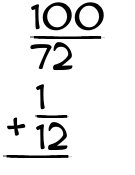What is 100/72 + 1/12?

|
This is how we add
|
||||||||||||||||||
Step 1We have to make sure the denominators are equal. 72 goes into 12 evenly, so we only need to multiply one term to get a common denominator. Multiply 1 by 6, and get 6, then we multiply 12 by 6 and get 72. This gives us a new problem that looks like so:
|
||||||||||||||||||
Step 2Since our denominators match, we can add the numerators. 100 + 6 = 106 That gives us an answer of
|
||||||||||||||||||
Step 3Can this fraction be reduced? First, we attempt to divide it by 2... Are both the numerator and the denominator evenly divisible by 2? Yes! So we reduce it:
So far so good... let's try to divide by that number again. No good. So next you try the next prime number, which is 3... No good. So next you try the next prime number, which is 5... No good. So next you try the next prime number, which is 7... No good. So next you try the next prime number, which is 11... No good. So next you try the next prime number, which is 13... No good. So next you try the next prime number, which is 17... No good. So next you try the next prime number, which is 19... No good. So next you try the next prime number, which is 23... No good. So next you try the next prime number, which is 29... No good. So next you try the next prime number, which is 31... No good. So next you try the next prime number, which is 37... No good. 37 is larger than 36. So we're done reducing. And we're done! Here's the final answer to 100/72 + 1/12
|